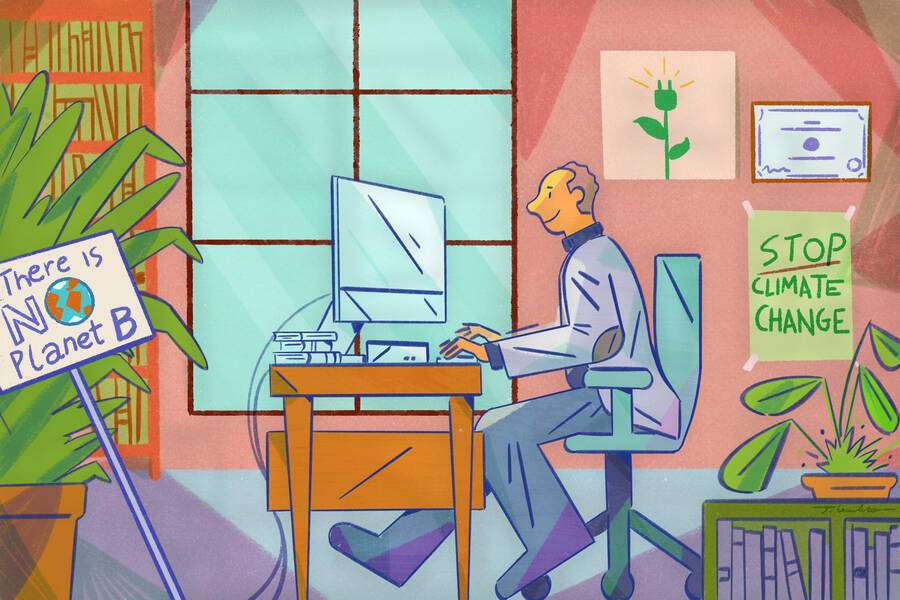“This is not a potentially transformational but an actually transformational time in our economy,” he says. “If companies don’t change, then they won’t exist in the future.”
Forward-thinking leaders should recognize that, in building on their strengths to become more sustainable, they also have a chance to innovate and outcompete their peers, says his colleague Klaus Weber, a professor of management and organizations and faculty director of the sustainability program at Kellogg. That is, sustainability doesn’t have to divert attention from a firm’s core functions; rather, it can enhance them and create new opportunities.
“Businesses miss out on chances to innovate when they don’t think of sustainability proactively as a long-term strategy,” Weber says.
Given the outcome of the 2024 U.S. Presidential election—and recent ESG backlash—firms undertaking global sustainability initiatives are going to have to contend with both the transition risks of future changes in consumer demand and regulation, and the operational risks that they currently must consider when deciding how to make sustainability work for them.
Weber and King spoke to Kellogg Insight about why firms should embrace sustainability—and how they can work with activists to make change.
Turn sustainability into a competitive advantage
Many companies view sustainability as a burden and are reluctant to go further than what regulations require. This is because it’s genuinely difficult to change how a business operates while also trying to keep the firm profitable. This is especially the case for larger, publicly traded firms that are beholden to investors’ expectations.
“As soon as you have any performance shortfalls, you’re going to get scrutiny from investors who care primarily about short-term profits,” Weber says. “So there’s always a risk that your great sustainability initiatives are going to get axed or scaled back.”
Even when leaders “understand the importance of the problem, their incentives aren’t always aligned,” adds King.
But this attitude has its own costs, say Weber and King. Companies that lag on sustainability stand to suffer reputational risks, operational risks, and loss of talent. But perhaps even more importantly, they also miss out on a
chance to innovate and develop a competitive advantage.
“Sustainability is not only reducing carbon emissions just because you have to,” Weber says. “It’s an opportunity to see market opportunities and develop new products and services that actually create new lines of business for them.”
Weber notes that a very simple first step towards this is robust data collection and measurement—and not just to meet reporting requirements.
“Most companies, especially the larger ones, are very data-driven in their decision-making,” he says. “If you don’t have information at your fingertips on, say, the implications of carbon emissions or water usage for a particular design decision, it’s not going to be part of the decision-making process.”
Companies should ensure they have the internal expertise not just to collect that data but to build on it in sustainable ways, a practice Weber calls an “upskilling of the workforce across the board.”
“That’s the future of the workplace,” King says. “You can’t be climate illiterate if you’re going to be a successful operator in this business world.”
For large incumbent companies, making this shift may involve adopting the mindset of a family-run firm by taking the longer view.
“If all you care about are next quarter’s returns, you’re obviously going to discount the importance of sustainability,” says King. “Family businesses are all about sustaining the long-term viability of that organization. They want to be able to pass the wealth on to the next generation.”
Embrace the role of activists
Weber and King also argue that activists have an important role to play in pushing businesses to take the longer view.
Activists come in many types. We are all familiar with public activism—someone tying themselves to a tree to protest deforestation or throwing soup on paintings to call attention to climate change. This type of activism is most effectively targeted toward large, consumer-facing firms that are familiar to many.
“Walmart cares about its brand reputation,” King says. “It doesn’t want to be labeled as a bad actor and come across as perpetuating the degradation of our world in any way. So Walmart has a very strong incentive to try to cooperate as much as it can. I don’t want to say that they are perfect, but they’re definitely doing things to try to become more green, more environmentally sustainable because of the pressures they face.”
But while public activism excels at drawing attention to a cause, it doesn’t necessarily offer solutions and ideas for combating the problem. This is where other, less-obvious actors can play a role in making firms more sustainable. Investors who care about long-term performance and are especially attuned to risks from, say, climate change can be vocal activists (or simply inadvertent activists if they shift their investments away from firms that aren’t operating sustainability).
Internally, sustainability managers can also have an activist role, promoting sustainability throughout an organization. They bring valuable expertise, but if they’re not given adequate power or voice within the company, they may struggle to make an impact.
Then there are employees who care about sustainability, some of whom form employee resource groups. They may occasionally borrow tactics from classic activism to create visibility for their cause (think of Google employees striking to protest the firm’s handling of sexual harassment), but they can be far more effective than outside actors.
“They operate as internal activist clubs in order to promote change in the organization,” King says.
“They’re activists because they care about the issue, but they also have a lot more knowledge about how to operate within those spaces.”
Weber points out that having sustainability-minded and knowledgeable employees across the organization can be the most effective way to create change.
“You get really substantial movement when the marketing managers, the product developers, the finance people, the operations people all have that knowledge and actually do it without someone giving them the prompt,” he says. “But I think it’s fair to say that most companies are pretty far from that state at this point.”
King adds that activists of all stripes should be seen as allies and not antagonists, and vice versa.
“Companies that invite in the activists and give them a seat at the table, and the activists who are willing to listen to the problems that companies are facing, these are the situations where you see the most learning and the most potential for innovation.”




